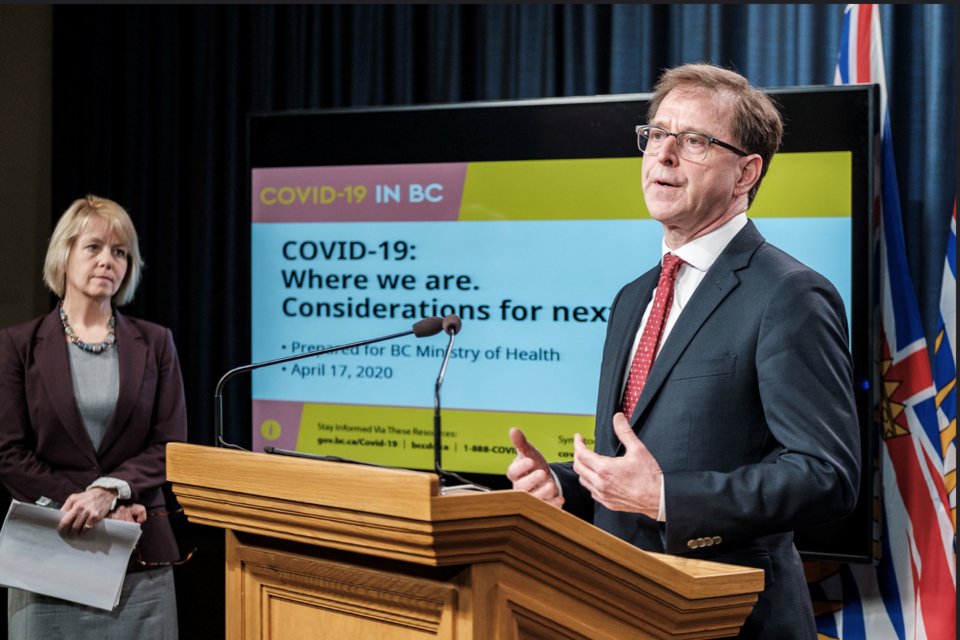There are now 1,647 cases of COVID-19 in B.C., after health officials announced 29 new cases Saturday.
That's down from the 43 new coronavirus cases the province announced yesterday.
According to Provincial health officer Dr. Bonnie Henry, there are 686 cases in Vancouver Coastal Health (VCH), 680 in Fraser Health, 97 on Vancouver Island, 150 in Interior Health and 34 in Northern Health.
There continue to be no new outbreaks in long-term care facilities. Currently, 20 outbreaks remain active in facilities and one acute care unit in the Vancouver Coastal Health and Fraser Health regions. However, there were additional cases associated with these outbreaks announced Saturday, bringing the total number of positive cases linked to long-term care facilities to 288.
Meanwhile, the outbreak at the Mission federal correctional institute in the Fraser Valley continues to grow. Now, the institute has 70 people who have tested positive, up from 63 cases Friday, and there has been one death related to the outbreak. Henry said 60 of the cases are inmates.
There are currently 115 people in acute care in hospital, and 54 are in intensive care.
Henry announced three more deaths related to COVID-19 in the last day, all of them in long-term care. That brings the province's total number of fatalities to 81.
She also reported that 987 people are considered fully recovered and are no longer in isolation.
Yesterday, the province released modelling that shows, "We are bending the curve," said Henry. Those who missed yesterday's briefing can go to the BC CDC's website to find the information Henry presented.
As the COVID-19 pandemic continue to progress, Henry likened B.C.'s current position to "a hurricane."
However, "we have made considerable progress in our province, and it's because of what everyone has done together," she said, citing British Columbians' committment to protecting our loved ones, communities, seniors and health care system.
"We can't lose sight of the fact that we continue to have people who are affected by this, We continue to have outbreaks, we continue to have transmission, and so we are not yet at the point yet where we can let up our guard."
Henry added, "The storm is still raging. Tragically we see that in the fact that peopleare still dying from this virus here in B.C. The risk of a spike, or another outbreak or more lcutsters in our community is something that is a very real concern for me."
She warned that the easing of restrictions, when they come, will be gradual, and implemented in a thoughtful and measured way. Due to the virus's long incubation period, Henry said officials have to think in two-week increments.
"We're nearing, maybe, the end of our storm, but we're in that eye of that storm right now. We're not going to be taking any measures in the next two weeks, but we are planning," Henry said. "We are planning for what it's going to look like when we get to that point in May - probably in the middle of May - where we are able to take those actions that help increase our social connections, increase our industrial and business connections, and also increase the opening up of our health care system."
However, B.C.'s "new normal" will still take into account important risk management practices like hand-washing, staying home if you're ill, and keeping your distance from others.
"We need to look at how we can open our schools, open our businesses, but still maintain those safe distances between us," said Henry, "That is what we'll be working on, with you and for you, in the next couple weeks. What we need to do now is to hold our line. Please keep doing what you've been doing."
Asked whether the public can realistically expect to see the return of larger events, for example, the PNE or Pride, this summer, Henry said no. "That is a much riskier prospect than ever before. We do not enough have enough herd immunity or community immunity to protect everybody and allow that type of event to happen."
In terms of smaller family events, like weddings, anniversaries or graduations, Henry said she reognizes that this is an exceptionally challenging time, but, "would tell people to think small."
"We're not going to be having large gatherings - we know that those are the types of events that [the virus] can be transmitted in. Particularly funerals, those family celebrations where we spend time together, weddings and parties where we share food and hug and care for each other in a very close way, unfortunately right now those are the things that are risky," Henry said. "I think we need to start thinking about planning small events, looking at how we can bring people together virtually, how we can support particularly our seniors and elders who are most at risk - support them being involved without being physically together."
She continued on to say that B.C. is looking to find a "sweet spot" that allows for more social connection while still protecting its health care system and those who are more vulnerable.
"It's going to be a modification for the next year," she said.
In her daily briefings, Henry encourages everyone to be kind to people who have to continue to work during the pandemic, such as those working in grocery stores, pharmacies, and in health care. She adds that isolation can be challenging, and that anyone who has an underlying illness should contact a doctor through virtual care. She mentions Anxiety Canada and Bounceback BC as useful resources for mental health.
Previosuly, Henry noted that people should consult the new online assessment tool if they aren't sure if they require further testing or assessment for COVID-19. She also underscored the importance of physical distancing, hand washing, covering your mouth if you cough, not touching your face and staying home if you are sick.



